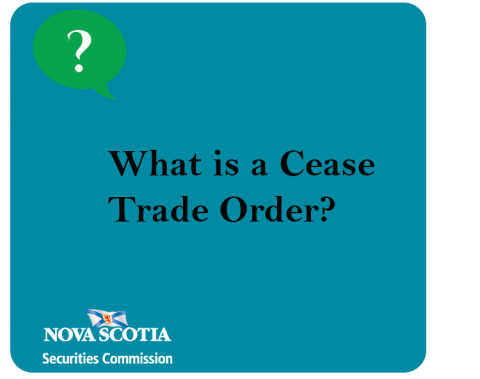Submitted by nsscadmin on

A cease trade order, or CTO as is commonly referred to, is a sanction available to the Nova Scotia Securities Commission when companies or individuals violate securities laws.
A CTO can be issued by a provincial or territorial securities regulator to prohibit a company or individual from trading in securities. The prohibition can be isolated to a particular type of security, it can apply to all securities, or anything in between. A CTO can be issued for a number of reasons including failure of an issuer to meet disclosure requirements or as the result of an enforcement action.
Here are a couple examples to show how CTOs work.
A public company is late filing their annual disclosure documents with the Nova Scotia Securities Commission. The commission gives the company a warning – a chance to “make it right.” This warning goes unheeded and the disclosure documents still do not arrive. A CTO can then be issued, prohibiting the company from trading their shares. This CTO can be revoked once the company files their disclosure documents and they have been reviewed by the NSSC.
In our second example, the NSSC receives reliable information that a person is advising on and selling securities in Nova Scotia despite not being registered to do so. The NSSC can issue a temporary CTO, prohibiting that person’s ability to advise on and sell securities in Nova Scotia. This CTO lasts for 15 days. After 15 days the CTO expires, unless the NSSC requests an extension. An extension will only be granted if it is in the public interest.
CTOs from across Canada are listed and archived in a CTO database, which can be found on the CSA website. The database states the reason the CTO was issued and if it expired, was revoked or remains in effect.
